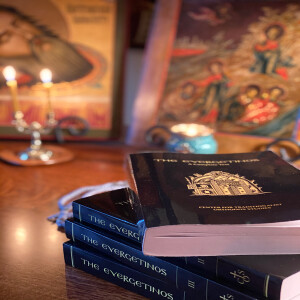VWhere do we live our lives? Who is God and how do we see ourselves and our own identity in light of the Incarnation? The writings of the Fathers have at their center these basic questions.
So often our tendency is to dissect the faith. We pull things apart - thinking that we are going to understand them with a greater clarity. Yet in doing so we lose sight of the whole. Can we understand Mystery of God or the other unless we allow ourselves to be drawn into it and what is beyond us. We lose sight of what God has revealed to us about Himself and about love. We lose sight of what that means for us, our identity and what it means to love others.
Whenever we take our eyes off of God and whenever we lose sight of our own poverty and need for mercy, immediately our eyes shift to the others and their flaws. Again and again the fathers tell us that even if we see negligence in others we are not to be scandalized by it. We are not to follow it, but we must not become haughty and judge what we perceive to be mediocrity.
Our focus is to remain on our own hearts and responding to the call to repentance and faith. We are to learn from experience. We must enter into the struggle, the warfare that exists within our own hearts and in our thoughts. Likewise, we are to avoid the things of this world that present us with a false image of life and reality. And most important of all: we are to keep our focus upon He who is Reality, He who is Meaning. It is through Christ and through Christ alone that we find the answers to our questions.
---
Text of chat during the group:
00:13:21 FrDavid Abernethy: page 207, paragraph 4
00:20:30 Jack: page?
00:21:12 Ambrose Little, OP: p207, #4
00:36:38 maureencunningham: I just watch the Movie Man of God.. He was very Holy
00:37:18 maureencunningham: he didi not allow the evil one to get his heart turned away from God
00:42:25 Erick Chastain: What's the balance between focusing only on our own sin to stir repentance and looking at those of others when you will incur sin by saying nothing about the sins of others (e.g. when fraternal correction is obligatory or when there are sins against justice)?
00:50:26 Erick Chastain: are you saying that therefore until there is this preparatory work helping the other carrying their burden, loving them, praying/sacrificing for them, etc fraternal correction is not obligatory under the pain of sin? (if the original desire to engage in fraternal correction was not from a spirit of critical judgment but just the desire to avoid sin?)
00:52:01 Samar Tabet: Can we correct
00:52:12 Samar Tabet: One sec
00:52:15 Samar Tabet: Corrective feedback
00:52:23 Samar Tabet: To priests or
00:52:26 Samar Tabet: Friends
00:52:32 Samar Tabet: Or bishop
00:52:38 Samar Tabet: If not related to sin
00:52:55 Samar Tabet: Letter for example
00:56:29 Carol: ‘If you want to find rest in this life and the next, say at every moment, “who am I?” And judge no one.’ Sayings of the Desert Fathers
01:00:36 Ambrose Little, OP: Your advice is direct from the lips of our Lord: “You hypocrite, remove the wooden beam from your eye first; then you will see clearly to remove the splinter from your brother’s eye." (Matt 7:5) Too often we believe we've already removed the beam when we haven’t at all.
01:01:45 Eric Ewanco: Seeing our own faults in another is called "projection"
01:05:28 Ambrose Little, OP: Hey, I love a good shower. :)
01:13:27 Carol: Was it cassian or climacus who also warned against joking?
01:14:34 Erick Chastain: Follow-up to Carol's: St Benedict warned against a certain kind of joking in his rule.
A related quote: "A friend is a second self, so that our consciousness of a friend's existence...makes us more fully conscious of our own existence." -Aristotle
01:15:15 Erick Chastain: (Aristotle)
01:20:28 Anne Barbosa: THANK YOU!

No comments yet. Be the first to say something!